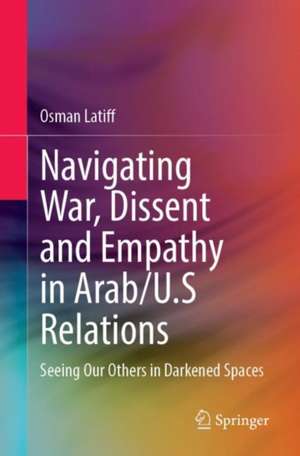Navigating War, Dissent and Empathy in Arab/U.S Relations: Seeing Our Others in Darkened Spaces
Autor Osman Latiffen Limba Engleză Hardback – 29 iun 2021
This comparative, multimodal study helps to explain shifting self-identities within the U.S, and relationally through the representation of the Arab other presenting an original and historicised contribution to the media-war field of academic and public debate. The book underscores empathy as a vibrant category of analysis that expands how we think about West-Arab relations, revealing how understanding the cultural aspects of this conflictual interrelationship needs to be broadened.
Preț: 471.71 lei
Preț vechi: 554.96 lei
-15% Nou
Puncte Express: 708
Preț estimativ în valută:
90.26€ • 94.49$ • 74.69£
90.26€ • 94.49$ • 74.69£
Carte tipărită la comandă
Livrare economică 07-21 aprilie
Preluare comenzi: 021 569.72.76
Specificații
ISBN-13: 9783030767464
ISBN-10: 3030767469
Pagini: 160
Ilustrații: XV, 160 p. 27 illus., 26 illus. in color.
Dimensiuni: 155 x 235 mm
Greutate: 0.44 kg
Ediția:1st ed. 2021
Editura: Springer International Publishing
Colecția Springer
Locul publicării:Cham, Switzerland
ISBN-10: 3030767469
Pagini: 160
Ilustrații: XV, 160 p. 27 illus., 26 illus. in color.
Dimensiuni: 155 x 235 mm
Greutate: 0.44 kg
Ediția:1st ed. 2021
Editura: Springer International Publishing
Colecția Springer
Locul publicării:Cham, Switzerland
Cuprins
Introduction Considering Adorno, Giroux and the Search for Empathy in War.- The Case of Alyssa Peterson Finding Empathy in The Cage.- Distance as othering US images of conflict inside and outside the homeland.- Landscaping Otherness and challenging frames of nothingness in contemporary Palestine.- The Mahmudiyah Killings and the framing of Abeer.- Syncretic Modes in Imagined Mourning These are Our Deaths.
Notă biografică
Osman Latiff, Ph.D. (2011), Royal Holloway, University of London, is a researcher in medieval and crusader history. He was recipient of the Isobel Thornley Fellowship (2010) and is the author of ‘The Cutting Edge of the Poet’s Sword: Muslim Poetic Responses to the Crusades’ (Brill, 2018). He completed a Post-doctorate study on counter-hegemony and political syncretism in Arab/U.S relations (2013) and has written and continues to write academic papers in the field of history, religion, war and empathy.
Textul de pe ultima copertă
This book focuses on American political discourse connected to war, dissent, and empathy. Through interdisciplinary methods of history, politics and media studies, the book examines ways in which American self-identity alters as a consequence of media portrayal of human suffering and of its existential others. It compares representations of the Iraq wars to earlier precedents and looks at the work of American activists, assessing how narratives and images of human suffering in new media iconography generate empathic attitudes towards others.
This comparative, multimodal study helps to explain shifting self-identities within the U.S, and relationally through the representation of the Arab other presenting an original and historicised contribution to the media-war field of academic and public debate. The book underscores empathy as a vibrant category of analysis that expands how we think about West-Arab relations, revealing how understanding the cultural aspects of this conflictual interrelationship needs to be broadened.
This comparative, multimodal study helps to explain shifting self-identities within the U.S, and relationally through the representation of the Arab other presenting an original and historicised contribution to the media-war field of academic and public debate. The book underscores empathy as a vibrant category of analysis that expands how we think about West-Arab relations, revealing how understanding the cultural aspects of this conflictual interrelationship needs to be broadened.
Caracteristici
Presents unique case studies, examining media and political representations of distant suffering Focuses on empathy across cultural lines associated with conflict, misunderstanding or domination Offers a new perspective on American self-identity altered as a consequence of media portrayal of human suffering
